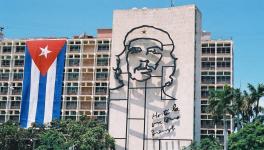House Democrats Urge Biden to Lift Sanctions on Cuba and Venezuela
Activists participating in the People's Summit for Democracy rallied outside the Los Angeles Convention Center in June 2022 to demand lift sanctions against countries like Cuba and Venezuela. Photo: Midia Ninja
A group of congressional Democrats in the United States have penned a letter to President Biden, urging him to lift sanctions on Cuba and Venezuela. As the letter argues, “Experts widely agree that broad-based US sanctions—expanded to an unprecedented level by your predecessor—are a leading contributing factor in the current surge in migration.” The representatives write to Biden, “We urge you to act swiftly to lift the failed and indiscriminate economic sanctions that were imposed by the prior administration.”
The letter was signed by Democrats in the House of Representatives, led by Representative Veronica Escobar and including Nanette Barragán of California, Raúl M. Grijalva of Arizona, Greg Casar of Texas, Alexandria Ocasio-Cortez of New York, and Rashida Tlaib of Michigan. Their stated objective is to end sanctions to stem the flow of immigrants crossing the southern border of the US.
The representatives are expected to receive strong pushback from pro-sanctions US officials, of which there are many. Senior US Senator from New Jersey, Bob Menendez, is a hardliner who holds significant influence as chairman of the Senate Foreign Relations Committee. Menendez claims to oppose Venezuela’s “regime” and wants to build a “democratic” state, meanwhile, he sponsored a bill that would have made boycotting Israel a federal crime carrying a 20-year prison sentence.
The letter’s timing is not accidental. It coincides with the expiration of Title 42, a harsh Trump-era immigration policy is set to end today, May 11. Title 42 used the COVID-19 emergency as an excuse to swiftly expel migrants to Mexico. As a result, a surge of migrants is expected to cross the southern border of the US. Several cities in Texas, including El Paso and Laredo, have already declared a state of emergency due to the expected influx of migrants.
Sanctions and migration
Migrants are increasingly leaving Venezuela to come to the US, a direct consequence of sanctions. In fiscal year 2018, US authorities reported fewer than 100 Venezuelan migrants at the Southern border. By fiscal year 2022, there were almost 188,000 Venezuelan migrants crossing the border.
A new report released by the Center for Economic Policy and Research has proven that economic sanctions often have deadly consequences. As “The Human Consequences of Economic Sanctions,” by economist Francisco Rodríguez found, “The evidence from almost all critical examinations of economic sanctions shows that they are very damaging—and sometimes lethal—for people who happen to be living in any of the many and growing number of countries subject to such measures by the US, the EU, or other powerful actors.”
Rodríguez noted, “The evidence shows that economic sanctions lead to declines in income and life expectancy similar to those in armed conflicts, making them one of the deadliest weapons used by western powers.”
Even US Treasury Secretary Janet Yellen, who essentially spearheads the economic sanctions, has admitted that sanctions have not “forced a change in behavior” as much as the US would like. Instead, in cases like Iran, Yellen admits that sanctions have created a “real economic crisis in the country, and Iran is greatly suffering economically because of the sanctions.”
The blockade by the US against Venezuela, much like in Cuba, has created fuel shortages, shortages in proper medical supplies as well as food, and a loss of income and revenue for the economy, as the US attempts to penalize Venezuela for the nationalization of its resources. According to statistics from 2019-2020, the blockade has resulted in more than 100,000 deaths, 2,500,000 food insecure people, 31.4% of the population undernourished and 22% of children stunted by the age of five.
Meanwhile, the Venezuelan opposition, and not the democratically-elected Venezuelan government, has gained access to USD 347 million in assets that were frozen by the US as a result of sanctions. However, the USD 3 billion agreed on between the government and opposition still remains unavailable for use by the Maduro administration. The money “should be drawn from Venezuelan assets seized by Washington and allies to invest in urgent social needs,” writes Andreína Chávez Alava in Venezuelanalysis. The US withholding those funds contributes to “blocking Venezuelans to see improvements in their living conditions in the near future.”
Get the latest reports & analysis with people's perspective on Protests, movements & deep analytical videos, discussions of the current affairs in your Telegram app. Subscribe to NewsClick's Telegram channel & get Real-Time updates on stories, as they get published on our website.
























